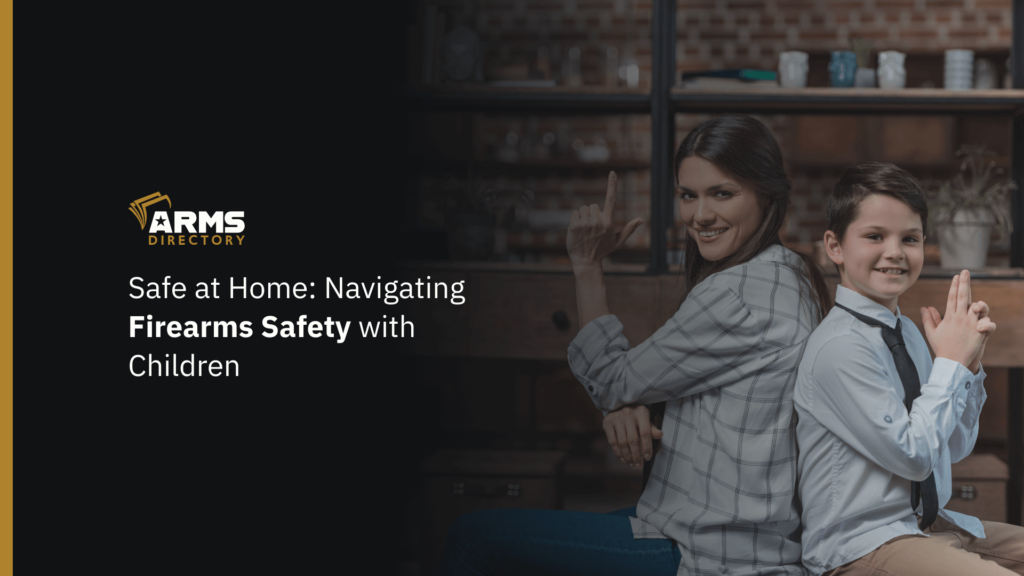
Safe at Home: Navigating Firearms Safety with Children
Guns are not a toy! They are a very serious matter, and not something kids should play with. In the United States, 46% of households have a gun, and there are roughly over 466 million firearms in the country.
The good news is that gun safety at home doesn’t have to be an issue. Teaching your children about guns, the dos and don’ts, from an early age can prevent a tragedy from happening in the future.
Now, let us delve deeper into the topic of gun safety at home.
Firearm Safety Rules: How to Keep Your Kids Safe
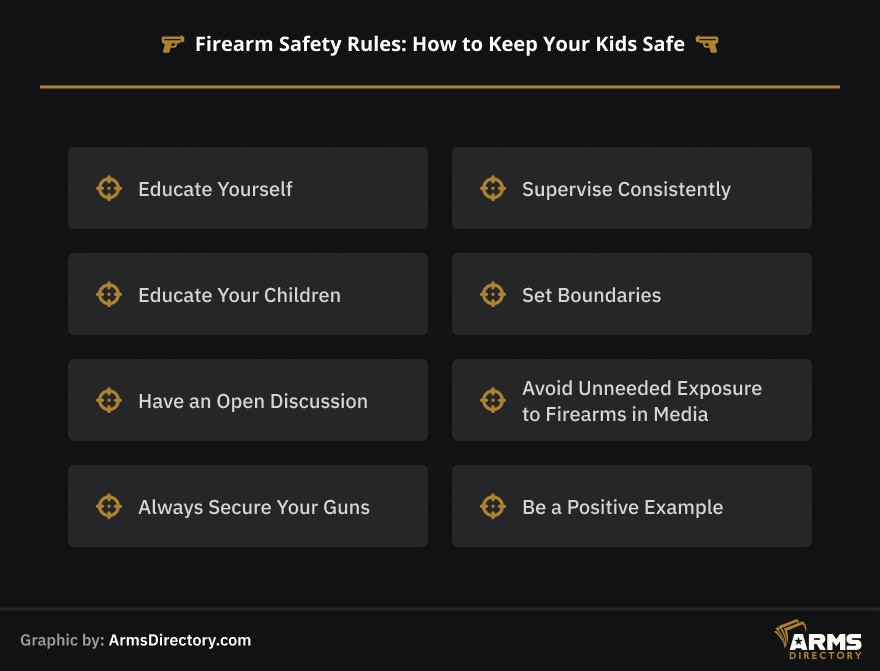
When it comes to the firearm safety of your children, it is extremely important to prioritize education, communication, and secure storage.
Here are a few tips to help you out:
- Educate Yourself . First, you need to make sure you have a good understanding of firearm safety rules, laws, and local regulations. Take a firearms safety course if you have not already. There are also gun safety courses for kids that you could sign your children up for.
- Educate Your Children . It is imperative to teach your children about firearms and their potential dangers. Emphasize the importance of never touching a firearm without adult supervision, and teach them the basic principles of firearm safety. Talking to kids about guns can really help keep them safe.
- Have an Open Discussion . It is much better to encourage an open dialogue with your kids about firearms, instead of turning it into a taboo topic. Make sure they feel comfortable discussing everything, and that you are comfortable answering any questions or concerns they may have.
- Always Secure Your Guns . You should always store firearms securely in a locked container or safe, with the ammunition stored separately. Make sure the key or combination is inaccessible to children. Consider using trigger locks for added safety.
- Supervise Consistently . Always supervise children when firearms are accessible, even if you believe they have been properly educated about the topic. It only takes a second for someone to get hurt or killed, so it is always better to be safe than sorry.
- Set Boundaries . Establish clear boundaries with your child regarding weapons. Teach them that they need to respect firearms and that they understand that they are not toys.
- Avoid Unneeded Exposure to Firearms in Media . Movies and television often showcase guns being used carelessly, and making them look “cool”. More often than not, kids soak up what they see, and take it as reality, thinking that it is completely normal to fire a weapon in public or without justification. Thus, try to limit the exposure of your children to violent media (movies, TV, etc.) that portrays firearms in a glorified or unrealistic manner.
- Be a Positive Example . Children learn by observing the behavior of the adults around them, so it’s important to set a good example. Make sure to secure your weapons and learn to handle them safely as well.
Finally, always remember that being safe is an ongoing process. Regularly remind your family as well as yourself of the basic rules and principles of firearm safety.
Related Post : How to Load a Shotgun Safely [Explained] – Arms Directory
How to Store Your Weapons Safely at Home: 8 Essential Gun Safety Rules at Home
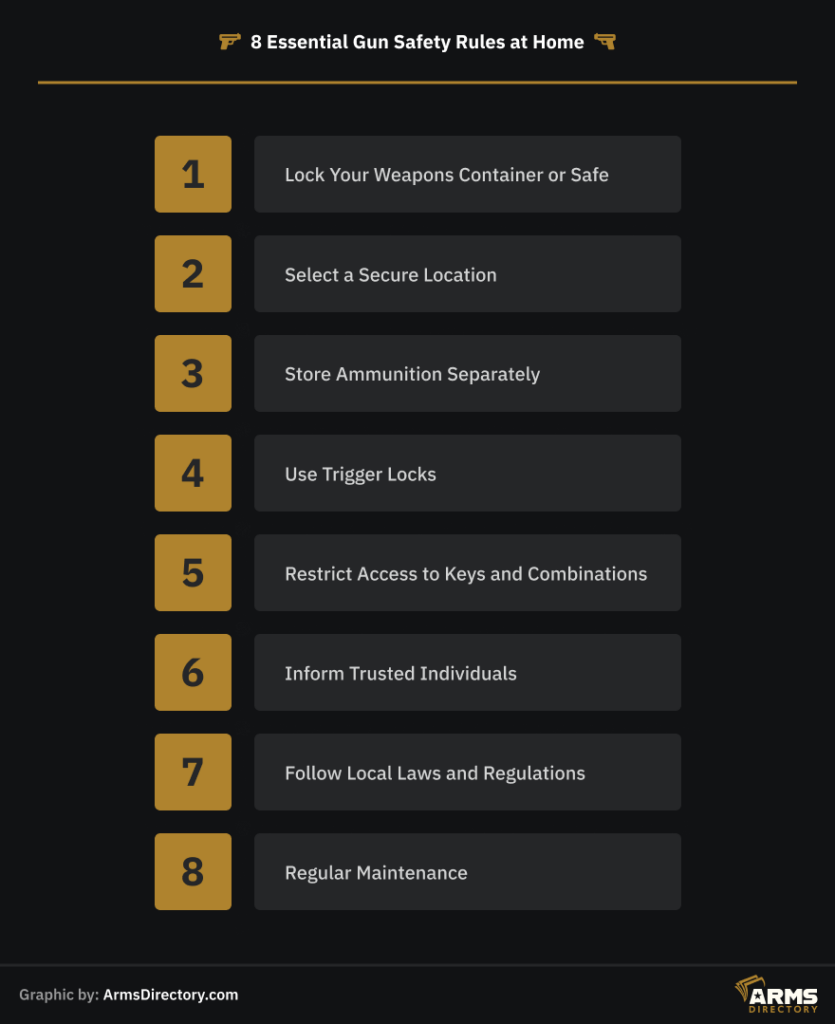
Proper storage is indubitably the overall rule when it comes to gun safety in the home. Let’s take a look at the most important tips:
- Lock Your Weapons Container or Safe . Store your firearms in a locked container or safe that is inaccessible to unauthorized individuals, especially children. This could be a dedicated gun safe, lockbox, or a locking cabinet specifically designed for firearms. In some cases, you will have bedside firearm containers for weapons you want to have instant access to. All other weapons, not immediately needed, should be kept locked. In all cases, you must educate your children about these guns, their proper usage, and dangers.
- Select a Secure Location . The locked container or safe should be placed where it is less likely to be spotted or accessed by unauthorized individuals. Consider a hidden or discreet location, away from children.
- Store Ammunition Separately . Store ammunition in a separate locked container or safe. This adds an extra layer of security and ensures that firearms cannot be loaded unintentionally.
- Use Trigger Locks . Consider using trigger locks in addition to a locked container. Trigger locks prevent the firearm from being fired, providing an additional level of safety and security.
- Restrict Access to Keys and Combinations . Having a gun safe/container would be pointless, if everyone knew the combination, or had access to the key. It is vital to ensure that it remains locked, the keys and/or combinations are kept in a secure location, and only authorized people have access to them.
- Inform Trusted Individuals . If you need to store your guns outside your home, ask individuals that you are sure you can trust (such as family members, close friends, or a shooting range) and who can properly store them on your behalf.
- Follow Local Laws and Regulations . It is advisable to familiarize yourself with the local laws that are applicable and pertain to the proper storage of firearms in your area. Some jurisdictions may have specific requirements, so it’s best to make sure you are in compliance with them.
- Regular Maintenance . Regularly inspect and maintain your firearms so that they are always in proper working condition. This includes checking for any signs of wear and tear, rust, or damage.
Related Post : Gun Registration Requirements by State [What You Need to Know] – Arms Directory
Keeping Your Children Safe at Other People’s Homes
Of course, you cannot keep your children safe at home at all times. That is why it is important to know how to address the situation appropriately when visiting the homes of friends and family.
Sure, you might feel a bit awkward asking your friends or relatives about the weapons they have at home and how they handle the safety of such devices, but it is not something you should be afraid to ask either. Just share your concerns respectfully, and perhaps start off by saying something like:
“My child is very curious, and I hope you don’t mind me asking, but do you have any firearms in the house, and is it properly stored?”
or
“I just wanted to make sure there aren’t any guns or anything else dangerous my child might accidentally get into.”
What is more, if you are not 100% sure that a home is following the proper gun safety rules, do not be afraid to keep your children from going there.
Final Words
Children are curious by nature. It is only natural for them to ask questions, and want to know more about the world around them.
Therefore, one of the most important safety rules that you can ever teach your children is to let your them know that guns are very dangerous, and they should never touch one, even if it looks like a toy. They should also leave the area where they found the gun, and most importantly, they should inform an adult about the weapon.
Remember, your own behavior around guns will reflect on how your children behave around guns. So set an example, be responsible, and treat guns with the respect they deserve.
Do you have any other gun safety advice for the home or for around children? Share them in the comments below, and don’t forget to check out our business directory.



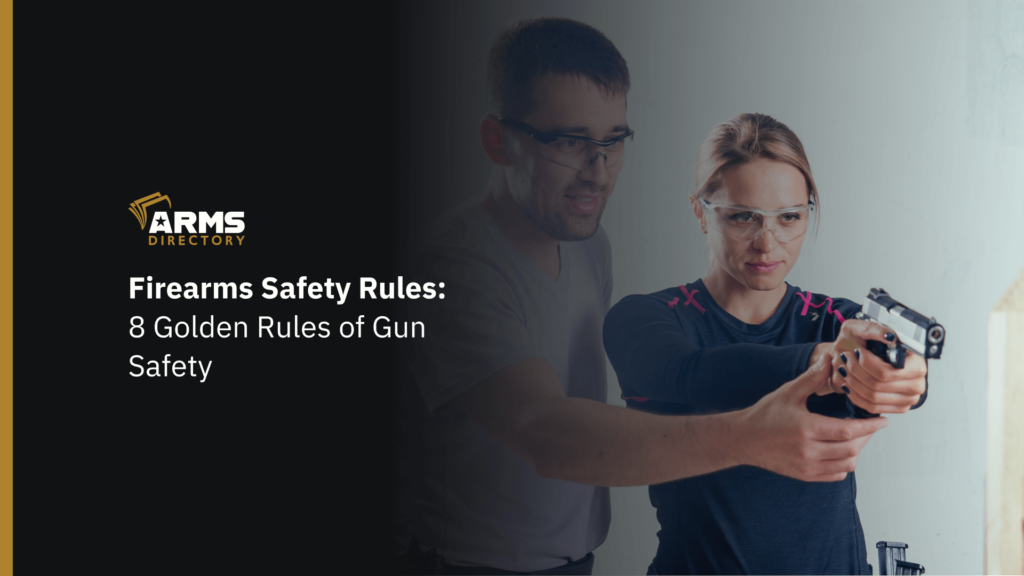
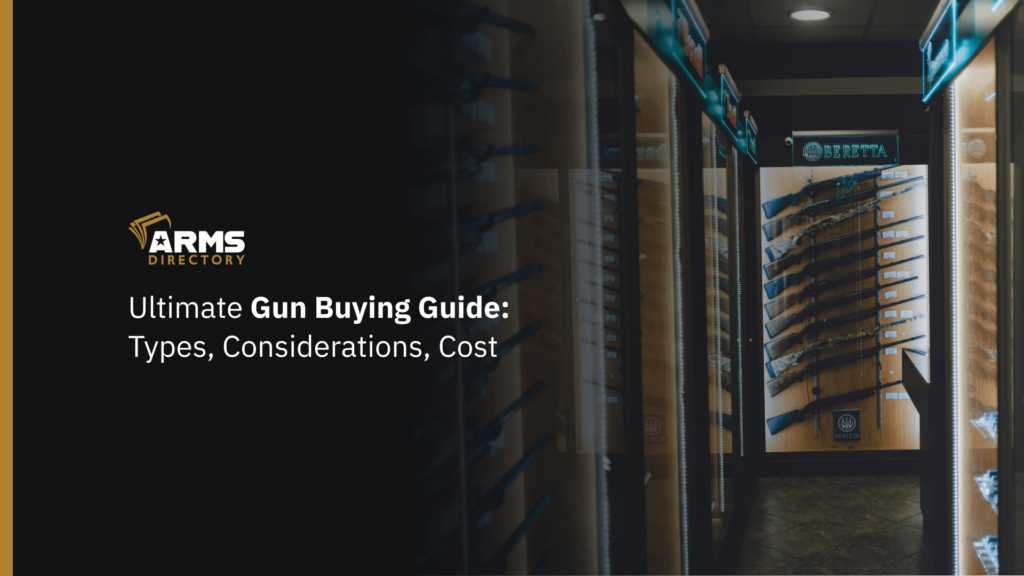
![The Right Way to Buy and Sell Firearms Online [Guide]](https://vault.armsdirectory.com/wp-content/uploads/2023/10/20050323/The-Right-Way-to-Buy-and-Sell-Firearms-Online-Guide-1-1024x576.png)
![The Ultimate Shooting Accessories for Every Weapon [A 2023 Beginners Guide]](https://vault.armsdirectory.com/wp-content/uploads/2023/08/30071223/The-Ultimate-Shooting-Accessories-for-Every-Weapon-A-2023-Beginners-Guide-1024x576.png)
![Gun Registration Requirements by State [What You Need to Know]](https://vault.armsdirectory.com/wp-content/uploads/2023/10/27073220/Gun-Registration-Requirements-by-State-What-You-Need-to-Know-1024x576.png)